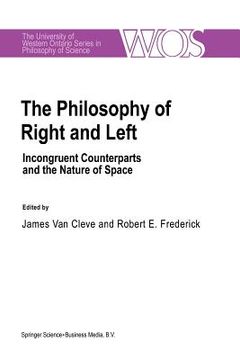Share
The Philosophy of Right and Left: Incongruent Counterparts and the Nature of Space
Van Cleve, J. ; Frederick, R. E. (Author)
·
Springer
· Paperback
The Philosophy of Right and Left: Incongruent Counterparts and the Nature of Space - Van Cleve, J. ; Frederick, R. E.
Choose the list to add your product or create one New List
✓ Product added successfully to the Wishlist.
Go to My Wishlists
Origin: U.S.A.
(Import costs included in the price)
It will be shipped from our warehouse between
Thursday, August 08 and
Thursday, August 15.
You will receive it anywhere in United Kingdom between 1 and 3 business days after shipment.
Synopsis "The Philosophy of Right and Left: Incongruent Counterparts and the Nature of Space"
Incongruent counterparts are objects that are perfectly similar except for being mirror images of each other, such as left and right human hands. Immanuel Kant was the first great thinker to point out the philosophical significance of such objects. He called them "counter- parts" because they are similar in nearly every way, "incongruent" because, despite their similarity, one could never be put in the place of the other. Three important discussions of incongruent counterparts occur in Kant's writings. The first is an article published in 1768, 'On the First Ground of the Distinction of Regions in Space', in which Kant con- tended that incongruent counterparts furnish a refutation of Leibniz's relational theory of space and a proof of Newton's rival theory of absolute space. The second is a section of his Inaugural Dissertation, published two years later in 1770, in which he cited incongruent counterparts as showing that our knowledge of space must rest on intuitions. The third is a section of the Prolegomena to Any Future Metaphysics of 1783, in which he cited incongruent counterparts as a paradox resolvable only by his own theory of space as mind-dependent. A fourth mention in the Metaphysical Foundations of Natural Science of 1786 briefly repeats the Prolegomena point. Curiously, there is no mention of incongruent counterparts in either of the editions (1781 and 1787) of Kant's magnum opus, the Critique of Pure Reason.
- 0% (0)
- 0% (0)
- 0% (0)
- 0% (0)
- 0% (0)
All books in our catalog are Original.
The book is written in English.
The binding of this edition is Paperback.
✓ Producto agregado correctamente al carro, Ir a Pagar.

